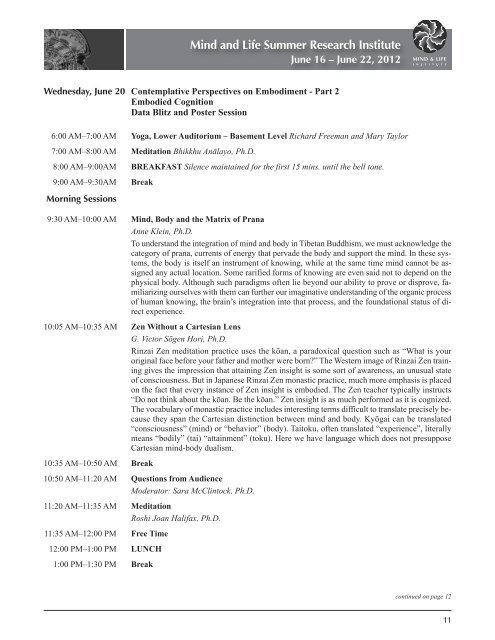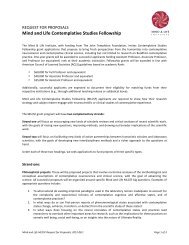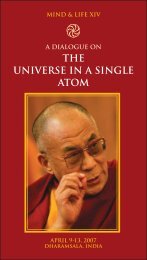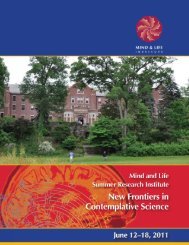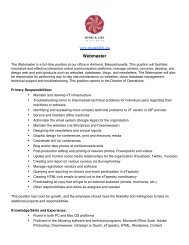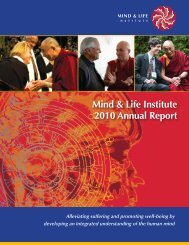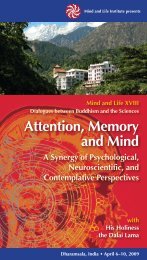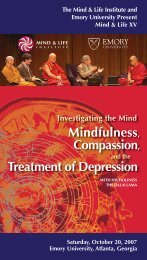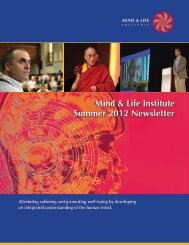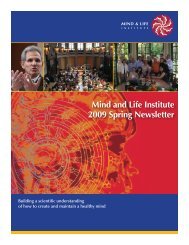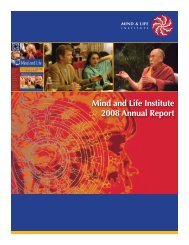CONFERENCE BROCHURE - Mind & Life Institute
CONFERENCE BROCHURE - Mind & Life Institute
CONFERENCE BROCHURE - Mind & Life Institute
You also want an ePaper? Increase the reach of your titles
YUMPU automatically turns print PDFs into web optimized ePapers that Google loves.
<strong>Mind</strong> and <strong>Life</strong> Summer Research <strong>Institute</strong>June 16 – June 22, 2012Wednesday, June 20 Contemplative Perspectives on Embodiment - Part 2Embodied CognitionData Blitz and Poster Session6:00 AM–7:00 AM Yoga, Lower Auditorium – Basement Level Richard Freeman and Mary Taylor7:00 AM–8:00 AM Meditation Bhikkhu Anālayo, Ph.D.8:00 AM–9:00AM BREAKFAST Silence maintained for the first 15 mins. until the bell tone.9:00 AM–9:30AM BreakMorning Sessions9:30 AM–10:00 AM <strong>Mind</strong>, Body and the Matrix of PranaAnne Klein, Ph.D.To understand the integration of mind and body in Tibetan Buddhism, we must acknowledge thecategory of prana, currents of energy that pervade the body and support the mind. In these systems,the body is itself an instrument of knowing, while at the same time mind cannot be assignedany actual location. Some rarified forms of knowing are even said not to depend on thephysical body. Although such paradigms often lie beyond our ability to prove or disprove, familiarizingourselves with them can further our imaginative understanding of the organic processof human knowing, the brain’s integration into that process, and the foundational status of directexperience.10:05 AM–10:35 AM Zen Without a Cartesian LensG. Victor Sōgen Hori, Ph.D.Rinzai Zen meditation practice uses the kōan, a paradoxical question such as “What is youroriginal face before your father and mother were born?” The Western image of Rinzai Zen traininggives the impression that attaining Zen insight is some sort of awareness, an unusual stateof consciousness. But in Japanese Rinzai Zen monastic practice, much more emphasis is placedon the fact that every instance of Zen insight is embodied. The Zen teacher typically instructs“Do not think about the kōan. Be the kōan.” Zen insight is as much performed as it is cognized.The vocabulary of monastic practice includes interesting terms difficult to translate precisely becausethey span the Cartesian distinction between mind and body. Kyōgai can be translated“consciousness” (mind) or “behavior” (body). Taitoku, often translated “experience”, literallymeans “bodily” (tai) “attainment” (toku). Here we have language which does not presupposeCartesian mind-body dualism.10:35 AM–10:50 AM Break10:50 AM–11:20 AM Questions from AudienceModerator: Sara McClintock, Ph.D.11:20 AM–11:35 AM MeditationRoshi Joan Halifax, Ph.D.11:35 AM–12:00 PM Free Time12:00 PM–1:00 PM LUNCH1:00 PM–1:30 PM Breakcontinued on page 1211


